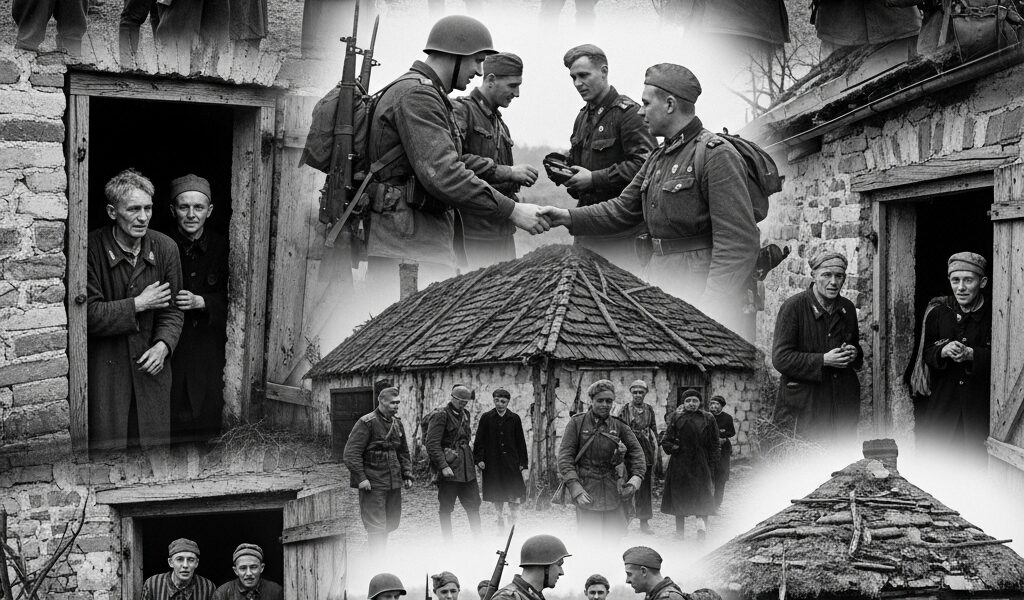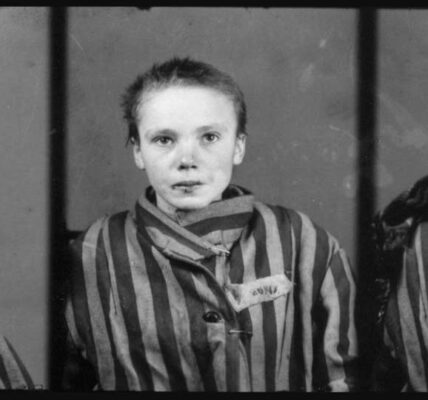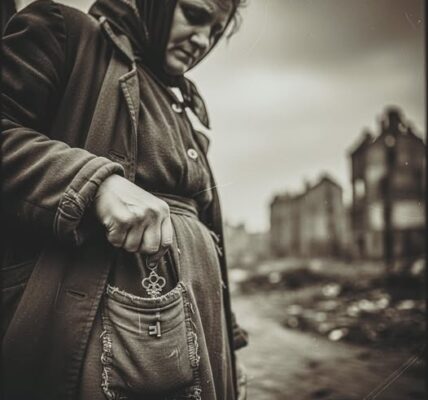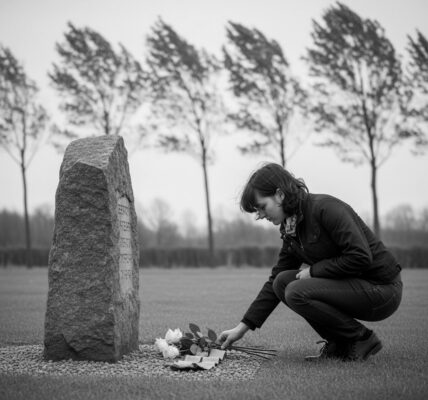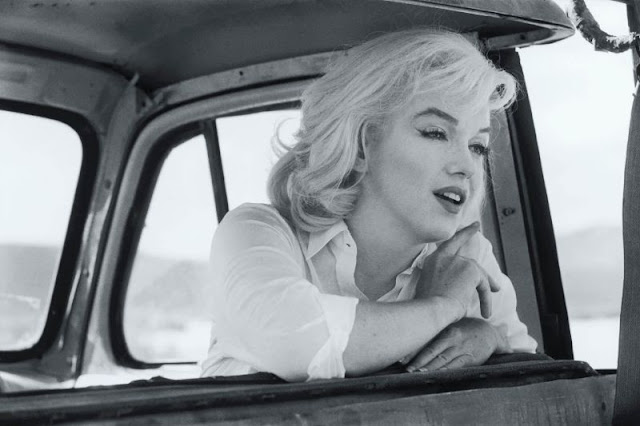May 1945 – A silence that tasted of freedom
When the last shots fell silent in May 1945, Europe was not yet jubilant. There were no fanfares, no joyous parades. A heavy silence reigned, thick with the smells of smoke and earth. In this silence, people emerged from cellars, forests, ruins, and old barns, their eyes narrowed as if from a long blindness. Thus ended the story of the Second World War , but the beginning of freedom resonated more as a whisper than a shout.
On the outskirts of a Polish village, amidst dilapidated wooden shacks, two Soviet soldiers encountered two men. They stood on the doorstep, arm in arm, emaciated, their faces sun-scorched. One of the soldiers took a piece of bread from his pocket and offered it to them with a trembling hand.
They exchanged no words. It was unnecessary: this gesture symbolized everything: the end of the war , the liberation of Poland , the hope that humanity could survive even in hell.
Months after the liberation of concentration camps like Auschwitz , the missing continued to be found. Some had survived by chance, others thanks to the courage of strangers. In small villages, under barns, in cellars, amidst the ruins, thousands of quiet stories of miraculous survival emerged.
Janek Nowak , a former schoolteacher from Lublin, found himself in such a place. For the last two years of the war, he had been hiding in the forest, helping the partisans. In May, he returned home—or rather, to the spot where his house had once stood. He found only a fragment of brick wall and a tree that still echoed with the voices of his children.
A stranger was sitting on the doorstep. He looked at Janek suspiciously.
“Who are you looking for?” he asked.
“My life,” Janek replied.
Those two words were enough for the man to understand. He stood up and stepped aside, and for the first time in years, Janek breathed the air without fear.
Where the school had once stood, weeds now grew. In their rustling, he heard the echo of his students’ laughter. It was then, for the first time, that he felt what he could call freedom—not triumph, but peace, the feeling that evil had finally fallen silent.
In camps like Auschwitz, Majdanek, and Ravensbrück, liberation was not sudden. For the survivors, time passed slowly. Each day after liberation was like a new apprenticeship in life: eating, sleeping, touching, speaking. Doctors strove to save the bodies, but the souls remained adrift between the world of the living and the world of the dead.
Zofia, a nurse who survived Auschwitz, later said:
“The worst thing was the silence. When you could no longer hear the orders, the dogs, the screams. That silence was like the echo of death. But with time, it became like a new breath. A silence that tasted of freedom.”
His brother, presumed dead, was found in a small village near Krakow. When they met, they remained silent. They simply held hands for a long time, as if a mere touch could confirm the reality of their reunion.
Their tears were no longer just tears of regret, but tears of purification.
Not all miracles had a hero’s face.
On a farm near Tarnów, an old woman looked after three Jewish children in a barn. For two years, she shared every slice of bread with them. When she learned in May 1945 that the war was over, she didn’t go out onto the road, she didn’t shout. She simply opened the barn door and said,
“You can leave now.”
The children didn’t know where to go. But the sun flooding the room was like a promise.
For many of them, freedom manifested itself in simple gestures: someone reached out, someone pointed the way, someone spoke a kind word.
These were small acts of compassion, often overlooked in the history of the Second World War . Yet it was they who rebuilt the world faster than any political treaty.
In May 1945, Poland was a land of wounds and ruins. Cities were deserted, fields littered with unexploded ordnance, and fear and exhaustion festered in people’s hearts.
Yet, everywhere, life persisted. Women resumed sewing, men rebuilt bridges, and children played football among the rubble. The scent of smoke and bread hung over the Vistula River—the smoke from ovens being lit for the first time in years.
It was hope —discreet, unassuming, but silent, like a prayer whispered between pursed lips.
Each survivor carried within them a shadow, but also a light. The shadow of the memory of what they had seen, and the light—that despite everything, life went on.
At the end of the summer of 1945, a photographer arrived in a village near Krakow. He was there to take pictures for a story on postwar reconstruction. Among his photographs was a scene later dubbed “the encounter after liberation”: Soviet soldiers and Polish partisans stood in front of a hut, and beside them, two emaciated men emerged from their hiding place. They
looked at the camera with a kind of smile—but it was the smile of those who had seen the worst of humanity and yet still held onto hope.
This photo has become a symbol – of the liberation of Poland , but also of the quiet heroism of ordinary people who survived.
Years have passed. One by one, the witnesses of these events have disappeared. But their stories have not vanished. In the archives, letters, and memoirs, the same voices still resonate: those of children who sang to drown out the cries; those of women who cared for the wounded without medicine; those of men who rebuilt schools after the war and taught the alphabet like a prayer.
Each memory is like a stitch mending the torn fabric of history.
That is why, today, when we look at photos from May 1945, we see not only soldiers armed with rifles or people in striped uniforms. We see humanity , which, though wounded, survived.
Freedom doesn’t always resound with the sound of trumpets. Sometimes it takes the form of an outstretched hand, a tear, a silent breath.
For those who emerged from the forests, the cellars, the camps, and the ruins, May 1945 marked the beginning of another life. A difficult life, certainly, but a life that belonged to them.
In one of the letters found after the war, an anonymous survivor wrote:
“I don’t know if the world will understand what it means to be free after Auschwitz. Freedom is being able to say your own name. It’s sitting on the threshold of a house, even if that house no longer exists.”
And perhaps that is why, today, when we speak of liberation , it is not just about dates and battles.
It is about those who, despite every reason to remain silent, chose life .
Their quiet courage is the true definition of memory , hope , and survival .
Note: Some content was generated using AI tools (ChatGPT) and modified by the author for creative purposes and to suit the historical illustration.
